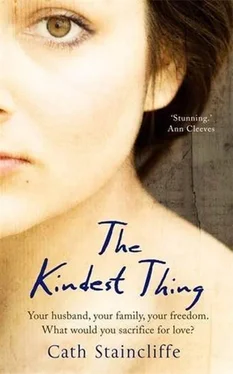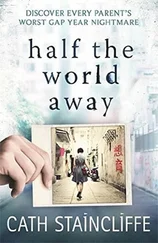‘Had she ever come to you for help with psychiatric problems?’
Andy Frame nods. ‘Yes. In 1993 she was under a lot of stress. I prescribed Prozac’
‘But not since then?’
‘No.’
‘If she had been under stress again would you expect her to come to you for help?’
He hesitates but what else could he say? ‘Yes.’
‘And she didn’t. Thank you, Dr Frame.’
The implication hangs heavy in the air. I wasn’t off my rocker when I helped Neil. I was as right as rain.
Mr Latimer has a few questions of his own for Andy Frame. He asks him about my medical history. Was I a frequent visitor to his surgery?
‘No.’
‘How often did Deborah Shelley come to see you, on her own account, in the years between 1993 and 2009? How many times a year?’
‘I don’t have the exact figures here.’
‘A general idea?’
‘Perhaps twice a year.’
‘And when you prescribed the Prozac for Deborah Shelley in 1993 this was in the aftermath of her mother’s death. Is that right?’
‘Yes.’
‘How long did she take the medication for?’
‘Six months.’
‘She could have taken it for longer if she wished?’
‘Yes.’
‘But she chose to come off the medication. Why was that?’
‘She didn’t like the side-effects, and she didn’t really feel it was helping.’
Mr Latimer pauses, turns a page of his notes and examines something.
There’s a juror on the second row, a weather-beaten man with long grey hair. I call him the Sailor. I imagine him salted and sozzled at ports around the world. He sneezes into a big white handkerchief, interrupting the thick weight of the silence.
Mr Latimer returns to the task in hand. ‘And in the years between 1993 and 2009 did Deborah Shelley ever seek your advice for help with stress?’
‘No.’
‘For depression or anxiety?’
‘No.’
‘Did she ever ask for a psychiatric referral?’
‘No.’
‘The appointments she made were to discuss physical ailments?’
‘That’s right.’
‘So, even after her husband’s diagnosis, or in the time when there were other family troubles, she did not come to you with any emotional problems?’
‘She didn’t.’
‘Thank you.’
The questions end abruptly and the jury look a little perplexed. The Prof rearranges his legs. The Sailor glances at his neighbour, the eldest of the two Asian men who is very plump. He has a little gesture, pinching the corners of his mouth together – it makes me think of someone savouring food so I nickname him the Cook. The other Asian man is much younger, with collar-length hair, and wears a colourful handmade jumper. The sort of thing from a designer stall rather than an unwanted present. He will be the Artist.
At this stage Mr Latimer can’t explain what’s significant about the GP’s answers. He will get his chance later. But he has told me already that he wants to show how unlikely I was to seek help, how Prozac hadn’t really helped me before so I wouldn’t bother asking for it as I became increasingly unhinged caring for Neil.
The prosecutor asks the judge if he has any questions for the GP. He does not. He thanks Andy Frame and tells him he may go. As he leaves there’s a little surge of activity among the lawyers, notes referred to, gowns straightened, water poured. As soon as the door closes behind the doctor, Miss Webber announces her next witness.
‘Call Mr Byron Wallis.’
He is one of the ambulance men. He’s wearing a nice suit, a white shirt and green tie. I don’t recognize him but I realize he is the man who tended Neil while his colleague asked me questions. He confirms his identity and affirms he will tell the truth.
‘Mr Wallis, you are a paramedic.’
‘Yes.’
‘You attended an emergency call on June the fifteenth at 14, Elmfield Drive.’
‘That’s right.’
‘Can you please tell the court what you found on your arrival?’
‘We went upstairs and there was a man in the bed. I checked for vital signs but he was dead.’
‘Did you carry out any procedures for resuscitation?’
‘No.’
‘Why not?’
‘It was too late. There were already signs of lividity.’
‘Can you explain what lividity is for the jury?’
‘After death, blood settles and pools. With a body lying on its back, like this one was, it’s visible in the underside of the limbs, the back, the fingernails. It’s the effect of gravity.’
‘What would it look like?’
‘Discoloration, like faint bruising, purple.’
‘And you observed this where on the deceased?’
‘On his fingertips.’
Oh, Neil. Unexpectedly, grief clasps my throat. I think of his fingers, long and slender like a pianist’s though he only ever played a guitar and that with little real skill. Just good enough to strum a few tunes round a campfire.
‘How long after death would lividity appear?’
‘From half an hour or so.’
‘And did Ms Shelley say anything about her husband’s condition?’
‘She said he had motor neurone disease, that he had been very ill.’
‘Do you recall seeing any medicines in the room?’
‘No.’
‘Did you look for any?’
‘No. We didn’t think it was a poisoning.’
‘A poisoning?’
‘An overdose.’
‘It was a sudden death?’
‘Yes.’
‘But at that point, judging by the information you had from Ms Shelley, you believed it was a natural death, occurring as a result of Mr Draper’s illness.’
‘Yes.’
‘No further questions.’
The first time Neil had raised the prospect was a few weeks after his diagnosis. We were still reeling from the shock and trying to find a way to interact. It was as if our old routines rang hollow, as though a new sun shone light on habitual gestures and exchanges, painting them false.
But what he hated, what we both hated, was that for a while, every smile and glance and touch was heavy with the burden of his prognosis.
One night we got drunk. We’d eaten late and shared wine with the meal and more after. We were looking through old photographs. Sophie was doing an art project and wanted pictures of celebrations. Neil and I ferreted our way through packets of prints, reminiscing about the phases the kids had gone through, the faces of people we no longer saw, birthdays and holidays and all the in-between days when I’d got my camera out. I remained chief photographer in the family.
When Neil opened another bottle, I raised my eyebrows.
‘Well, I’m not exactly bothered about liver cancer any more.’
Giggling, I held out my own glass. ‘Silver lining.’
He poured and began to speak. ‘When things get bad, I want to be here. Not some hospice or hospital.’
‘Yes,’ I agreed, without hesitation.
He sought my eyes. ‘Deborah, if I wanted to choose when it happened, if I needed help…’
There was a spurt of fear in my stomach. His words sobered me up but I pretended to be pissed still, hiding my panic and slurring my words. ‘I’m sure the doctors’ll sort you out. They do that nowadays.’
He wouldn’t let me go, his eyes clamped on my face. ‘I’m not asking them,’ he insisted.
I was scared, scared by what he was asking and by my own cowardice. I wanted to say no. My first instinct was to say no. I closed my eyes, tilted my head back to escape his scrutiny. When I recovered and opened my eyes he was looking down at the coffee-table, his fingers tracing a line with the spilled drops of wine.
After a while we resumed drinking, sifting through the photos, but the wine tasted acidic, our recollections were superficial, going no deeper than the obvious anodyne memories: Adam loved that trike, the time Sophie ate the sand.
Читать дальше












